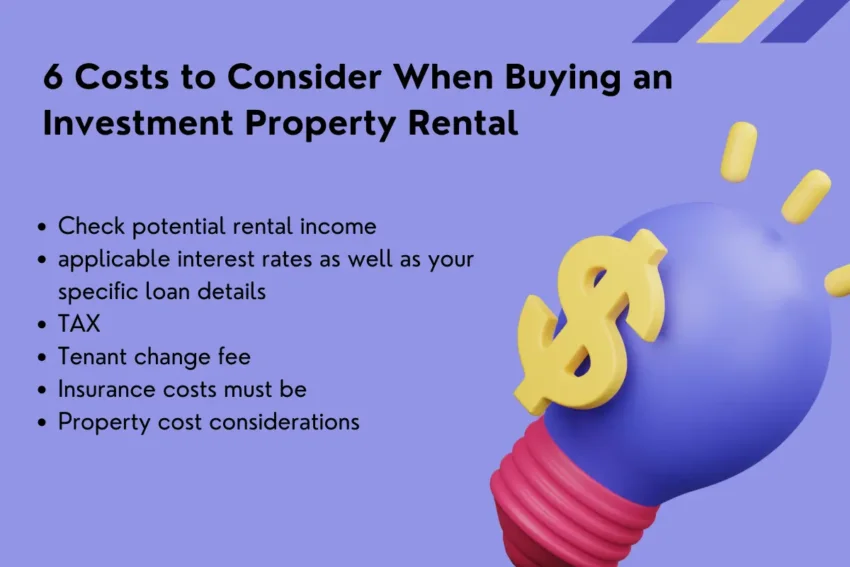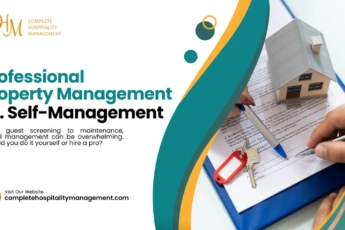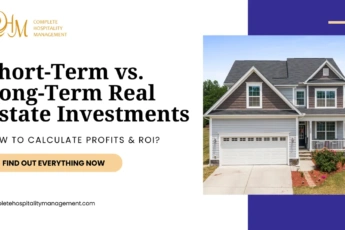9 Tips For Buying Investment Property – Things to Follow and Frequently Asked Questions in 2025
So, is it worth buying to let and earning rental income? How to proceed to make a rental investment? We share all our advice with you to see your investment with a serene eye. Let’s explore 9 of the most needed tips for buying an investment property!
Do you want to invest in real estate, like many other people? You are right! In times of crisis, real estate remains one of the only profitable tangible assets and is a real bulwark against inflation. In addition, rental property investment is a tool specifically adapted to build up additional income to prepare for retirement. So, let’s talk about 9 tips to keep in mind for buying an investment property.

9 pro tips for buying an investment property
1. Calculate your borrowing capacity without rents
When buying real estate, unless you have a lot of cash, it is pretty rare to buy a house or an apartment without going through the bank box. You are certainly wondering how much you can borrow to finance the rental property purchase and estimate your investment amount.
Your borrowing capacity is certainly one of the most essential elements in setting up your rental investment project. It determines the maximum amount allocated by the bank and, therefore, the real estate transaction price you can buy.
In theory, buy-to-rent is a rather profitable investment; the bank must ensure that there is the least financial risk before deciding whether or not to grant you your financing. So how do you apply for credit and support your request with the lender?
First of all, know that all of your fixed income is studied with a magnifying glass, during your request. If you have a personal contribution and your bank accounts are in credit, you ensure you get a favorable opinion from your kind banker more easily!
To calculate your borrowing capacity, banks study your debt ratio. This is an important criterion when buying a property. The maximum debt ratio accepted is 35%, leaving enough to live on.
You will not be able to exceed this rate, even by arguing that you recover a rent partially covering the amount of your monthly payments.
Here are the parameters taken into account by the banks to study your request for financing and calculate your purchasing capacity:
- Your fixed income;
- The amount of your personal contribution;
- Your other current credits and the amount of monthly payments to be repaid;
- The desired term for your loan (15, 20, or 25 years);
- Purchase new or old (this factor allows you to define the amount of notary fees included in your borrowing capacity);
- The maximum desired interest rate for this mortgage.
2. Establish the profile of your future tenant
Wondering what type of apartment or house to buy to rent? Already ask yourself the question of the type of tenant you would like to have in your future rental accommodation.
If you prefer having one or more students in a shared property, it will not be the same as having a family with children as tenants. In the context of a short or medium-term seasonal rental, the profiles of holidaymakers involve the purchase of an apartment or a house to be furnished.
Therefore, one of the tips for buying an investment property is to consider your tenants’ profile as an important piece of data, which must be determined from the start of your real estate search. Each profile has its advantages and disadvantages.
Students as your future renters
Students are looking for less expensive properties to rent and, therefore, smaller (studio, 2-bedroom apartment) and tend to move more regularly depending on their studies. However, student rental demand is very strong, as many students seek an accommodation solution each year, and the public supply is significantly lower.
Accommodation for families
On the family side, housing needs are concentrated in larger areas with terraces or gardens. The rental vacancy is more limited because they stay longer, but the demand is also less strong because this profile of tenants seeks to become the owner of their main home quickly.
With a huge number of family apartment examples that we have in the Dominican Republic, you can familiarize yourself on our website.
3. Carefully choose the city where you want to buy
As with any real estate purchase, select the property’s location carefully. The accommodation must be in an area with strong rental demand and where your property will increase in value over time.
Do not hesitate to choose a dynamic city with a growing population and select a district close to schools, public transport, and infrastructure (cultural or sports). Depending on the type of tenant profile that you have defined previously, you are not necessarily looking for the same location to invest.
Also, take into account the economic development of a city and its employment pool. Take a quick look at what major businesses or industries are present nearby. This is an interesting indicator allowing you to increase the occupancy rate of your accommodation and hope for a capital gain on resale, if necessary.
To further refine your project, find out about the local real estate market (by consulting online a real estate agent) to get a more precise opinion on rental demand and the rate of vacant housing in the chosen sector. You will also know the rental prices charged and thus avoid offering a higher rate than the average, to be sure to rent your property quickly.
Finally, compare the rental yield offered by the different cities of the country where you could potentially invest. The acquisition price per m²/rent ratio is indeed extremely variable from one location to another. As an instrument, you can use Airbnb to establish the right price for renting out your property!
4. Ask yourself the question of taxation
Rental property investment is a tangible and profitable investment that can also benefit from tax advantages allowing you to reduce your income tax. Indeed, reductions are granted on certain eligible properties in return for a rental commitment. If you wish to realize a real estate tax exemption, you will have to acquire a dwelling falling within the criteria defined by the government.

Top 6 costs to consider when buying an investment property
But not all tax systems are necessarily adapted to your personal and professional situation. You will prefer one measure over another depending on your wealth objectives, your marginal tax rate, or the tax benefits granted. Each has its own set of advantages and disadvantages.
With a reduced savings effort, rental real estate thus has a significant leverage effect.
5. Find out about the obligations of the landlord
As you read our tips for buying an investment property, you are about to become the owner of your real estate! Be aware, however, that as an owner, you must provide your tenants with decent housing in good condition and maintain it regularly. Thus, the rented accommodation must be able to be occupied immediately by the tenants without having to carry out repair work.
It doesn’t have to be completely new if you’re investing in the old one, but the flooring and walls should be in good, worn condition. If the accommodation has outdated or unusable equipment, the landlord must replace it and pay for the necessary work. Throughout the duration of the lease, you will have to take charge of any major repairs and guarantee the tranquility of your tenants.
Here are the mandatory criteria to meet to rent accommodation:
- It must not pose a risk to the health or safety of the tenants;
- It must be provided with the mandatory comfort equipment;
- It must have a minimum area of 9 m² with a minimum ceiling height of 2.20 m.
In the case of work to be carried out, the owner and the tenant can agree together on the assumption of responsibility for the work by the tenant in return for a reduction on their rent. It is necessary to clearly indicate in the lease the type of work to be carried out by the tenant, the amount of the rent reduction, and its duration.
6. Property management company vs personal management
You must now think about the rental management of your property. Rental management includes all the steps to be taken when your tenant is in place. A successful rental investment goes through optimized management of its properties. You can choose to manage your accommodation directly yourself, search for tenants, entries and exits, and inventory of fixtures, but this is a time-consuming activity.
If you are still hesitating between your own management and delegated management with a professional, do not hesitate to list the advantages and disadvantages of each type of management to define which one will best suit your lifestyle.
Deciding between a property management company and self-management
| Aspect | Management company | Personal management |
|---|---|---|
| Responsibilities | Handles tenant communication, rent collection, maintenance, and property marketing. | Directly manages all aspects of property, including tenant interactions and repairs. |
| Expertise | Offers professional experience and industry knowledge. | Requires knowledge in property management and landlord-tenant laws. |
| Time commitment | Requires less personal time involvement as the company handles day-to-day tasks. | Demands substantial time for managing tenants, repairs, and administrative work. |
| Scalability | Suitable for multiple properties or busy investors. | Practical for a single property or fewer units. |
| Cost | Incurs management fees, typically a percentage of rental income. | Saves on management fees but may involve costs for own time and efforts. |
| Tenant relations | Acts as intermediary, handling tenant issues and disputes. | Directly interacts with tenants, resolving issues personally. |
| Maintenance oversight | Coordinates property repairs and maintenance with contractors. | Organizes repairs and maintenance independently. |
| Legal compliance | Ensures adherence to local laws and regulations. | Requires understanding of landlord-tenant laws. |
| Vacancy management | Markets vacancies and finds new tenants efficiently. | Manages advertising, screening, and lease signing personally. |
| Emergency availability | Provides 24/7 support for emergencies. | Handles emergencies but availability may be limited. |
| Financial reporting | Offers detailed financial statements and reports. | Tracks income and expenses for personal records. |
| Peace of mind | Provides peace of mind through professional management. | Offers direct control but involves more responsibilities. |
Make no mistake, managing a home takes a lot of time! The budgetary aspect often leads owners to carry out these various tasks themselves to increase their rental yield. However, be aware that even if the remuneration of the services of a management company is high, it is not the only element to consider.
If you already work a lot, know that you will surely be even more overwhelmed because the workload related to the management of a property and its various difficulties inevitably encroach on your private life. Real estate rental management requires particular expertise (rent collection, issuance of receipts, repairs, regularization of charges, tax declarations, etc.).
Here is the breakdown of the average costs of delegated rental management:
- Rental management alone: between 4.8 and 9.6% of rents collected;
- Rental: between 50% and 150% of the monthly rent (corresponds to an annual cost of 1.5% to 4.4% of receipts).
If you want to get more tips for buying an investment property, read on. But if you would like to consider hiring a property management company, you should look at what we propose and what you will get!
7. Go through a broker to optimize your loan application file
Now we focus on financing your real estate investment. You can choose between going around the banks to compare their rates and trying to obtain the best possible conditions or going through a broker.
The broker, a real professional in bank financing, is an intermediary between the banks and you, the investor. Hiring the services of a mortgage broker has many advantages:
- They save you time. They identify the most competitive financing offers for you and study your project’s various possible financial arrangements.
- They can help you obtain the best real estate rates, advise you on the choice of borrower insurance and support you, depending on the type of bank loan you wish to make.
After an in-depth study of your personal and professional situation, you will see whether it is more advantageous for you to acquire rental accommodation through a property tax exemption law, whether you have to buy new or old…
8. Do not seek excessive profitability
If you want to invest in real estate to build your assets and obtain greater profitability than with a traditional investment such as a Housing savings plan, real estate investment offers great opportunities. More lucrative than precautionary savings, real estate can allow you to achieve high returns.
But do not seek at all costs to buy a property solely for its profitability. A gross rental yield ranging from 3% to 4% is quite suitable. Investing in a property with average profitability but little rental vacancy is better than the reverse.
9. Take out a rent guarantee insurance
Have you already bought your home? Now think about securing your rental income by taking out a rent guarantee insurance (RGI).
The RGI is insurance taken out with a private insurer by the owner-lessor of a rental property to cover, as its name suggests, the unpaid rents of its tenants. In case of non-payment of rent by the tenant, the insurer undertakes to reimburse the owner for the sums not received.
It can also be taken directly from the management company. Your accommodation is thus insured against unpaid rent and charges but also against any damage, procedural, and litigation costs.
As in any insurance contract, do not hesitate to compare the existing offers on the market, the duration, the terms of coverage, and the cost of RGI insurance. Note that the cost of the RGI depends on the amount of the rent and varies between 2.5% and 5% of the annual rent charged.
As a conclusion
A successful real estate investment requires careful preparation of your project: budget, financing, type of property, and place of purchase. Follow our 9 tips for buying an investment property to make this way more manageable.
To put the odds on your side, have a credit pro accompany you for your financing request. Consider the obligations related to your future status as a landlord: taxes and rental management involve costs that you must bear in mind.
Frequently asked questions on how to
tips for buying investment property

The most popular FAQ about buying an investment property
1. What is the best property to buy for investment?
The best property to buy for investment depends on your goals, risk tolerance, and market conditions. Generally, properties with strong rental demand, potential for value appreciation, and favorable location are attractive.
Consider options like residential rentals, multifamily properties, commercial spaces, or short-term rentals. Thorough research, understanding local markets, and consulting experts will help you make an informed decision that aligns with your investment objectives.
2. What is the most profitable property investment?
Profitable property investments vary. Real estate development, short-term rentals, fix and flip, value-add opportunities, and commercial real estate can offer high returns. Thorough research and risk assessment are key for success.
3. How can I increase the value of my investment property?
Increasing the value of your investment property involves strategic improvements and effective management:
- Enhance curb appeal.
- Upgrade interiors, energy efficiency.
- Maintain repairs and amenities.
- Tech and storage solutions.
- Effective property management.
- Consider market trends for strategic improvements.
Each improvement should align with your budget, target market, and property goals. Prioritize upgrades that will yield the most value and appeal to potential tenants or buyers. Regularly assess market trends and stay informed about your property’s performance to make informed decisions about improvements.
4. Which property has the lowest investment risk?
The property type with the lowest investment risk can vary depending on market conditions and individual circumstances. Generally, residential properties tend to have lower risk compared to other types. Within residential properties, single-family homes in stable neighborhoods often have lower risk due to factors like:
- There’s consistent demand for rental homes in good locations, ensuring a stable tenant pool.
- Unlike commercial properties, single-family homes tend to be less affected by market fluctuations.
- Families, professionals, and individuals seek single-family homes, reducing reliance on a specific tenant demographic.
- Maintenance is usually straightforward compared to larger properties, reducing unexpected costs.
- Financing is often more accessible and favorable for single-family homes, especially for first-time investors.
- People often rent homes for longer periods, providing consistent rental income.
- Over time, well-maintained single-family homes can appreciate in value, providing long-term returns.
All investments carry some level of risk. Lots of factors can influence it. Thorough research, understanding market dynamics, and consulting with real estate professionals can help you make informed decisions that align with your risk tolerance and investment goals.
5. What is the highest ROI in real estate?
The highest ROI in real estate varies. Strategies like fix and flip, short-term rentals, real estate development, and value-add opportunities tend to offer potentially higher returns. However, these strategies also involve higher risk and expertise requirements.
6. Who is the most successful real estate investor?
Determining the “most successful” real estate investor can be subjective and may vary depending on the criteria used, such as total portfolio value, number of properties owned, overall wealth, or influence on the industry. Some well-known and accomplished real estate investors include:
- Donald Bren. The chairman of Irvine Company, Bren is one of the wealthiest real estate developers in the United States and is known for developing master-planned communities.
- Sam Zell. A prominent real estate investor, Zell has been involved in various property types and has a reputation for identifying market opportunities.
- Warren Buffett. While primarily known for his investments in stocks, Buffett’s Berkshire Hathaway owns a significant portfolio of real estate assets, including residential and commercial properties.
- Stephen Ross. Founder of Related Companies, Ross is known for developing large-scale, mixed-use properties, and he’s involved in real estate ventures worldwide.
- Barbara Corcoran. A notable figure in real estate, Corcoran founded The Corcoran Group, a successful real estate brokerage, and is also recognized for her role on the TV show “Shark Tank.”
- Donald Trump. Prior to his political career, Trump was a real estate developer and businessman with a diverse portfolio of properties, including hotels, casinos, and luxury developments.
- Richard LeFrak. A prominent real estate developer, LeFrak is known for his involvement in various large-scale projects, particularly in New York City.
- Harry Macklowe. A New York-based developer, Macklowe has been involved in high-profile projects such as 432 Park Avenue, one of the tallest residential buildings in the world.
Success in real estate can be defined in various ways, and different investors excel in different aspects of the industry. Additionally, economic conditions and market cycles can fluctuate, and real estate fortunes can fluctuate.
7. Where is the highest ROI on houses?
The location with the highest return on investment (ROI) for houses can vary over time due to market fluctuations and trends. Generally, areas with strong job growth, population growth, and limited housing supply tend to offer higher ROI.
Metropolitan areas, tech hubs, and regions experiencing economic development often have potential for higher house ROI. However, thorough research and consulting local real estate pros are crucial to identify the current best locations for high ROI on houses.
Updated on: . Author:






